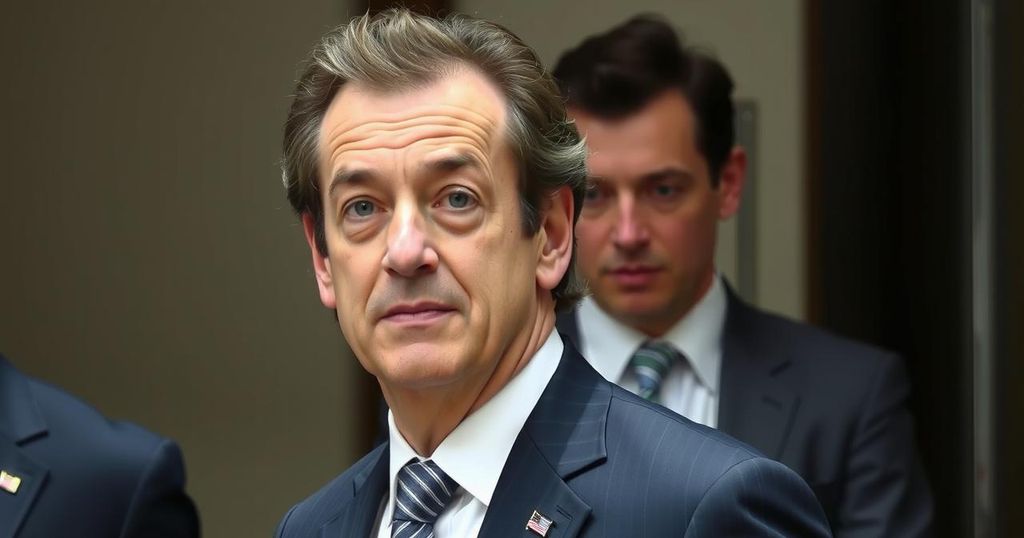Nicolas Sarkozy Faces Trial for Alleged Gaddafi Election Funding

Former French President Nicolas Sarkozy is on trial in Paris for allegedly accepting illicit funds from Muammar Gaddafi to finance his 2007 election campaign. Sarkozy denies the charges, suggesting they are motivated by a desire to discredit him. The trial includes twelve other defendants, and if found guilty, Sarkozy faces up to 10 years in prison.
Nicolas Sarkozy, the former President of France, is currently undergoing trial in Paris, facing allegations of accepting substantial illicit funds from the late Libyan leader Col Muammar Gaddafi to support his successful 2007 presidential campaign. The prosecution posits that in return for these funds, Sarkozy assured assistance to Gaddafi in rehabilitating his standing among Western nations. Sarkozy, aged 69 and in office from 2007 to 2012, steadfastly denies these accusations, attributing them to adversaries seeking to undermine him.
The inquiry commenced in 2013, following claims made by Saif al-Islam, Gaddafi’s son, who asserted that Sarkozy had accepted millions from his father for electoral financing. Subsequently, in 2014, Ziad Takieddine, a Lebanese businessman, alleged that Sarkozy’s campaign received significant financial support from Tripoli, including payments totaling €50 million (£43 million), continuing post-election.
Alongside Sarkozy, twelve other individuals accused of orchestrating this purported arrangement with Gaddafi are also facing trial, all maintaining their innocence. Additionally, Sarkozy’s spouse, Carla Bruni-Sarkozy, faces charges of concealing evidence related to this case and associating with criminal elements. She too has denied these allegations.
Since his defeat in the 2012 elections, Sarkozy has been subjected to multiple criminal investigations. He has appealed a ruling from February 2024, which found him guilty of overspending during his reelection campaign and subsequently attempting to conceal this fact, resulting in a one-year prison sentence, with six months suspended. Additionally, Sarkozy was convicted in 2021 for attempting to bribe a judicial figure, marking a significant legal precedent as he became the first former French president to receive a custodial sentence. The Paris appeals court has since permitted him to serve his sentence at home equipped with an electronic monitoring device. On Monday morning, Sarkozy attended court without the device, as the conditions of his sentence have yet to be finalized. During the forthcoming three-month trial concerning the alleged Libyan funding scheme, it is anticipated that he may appear wearing this tracking device. The trial is scheduled to continue until April 10, with potential imprisonment looming should he be found guilty, facing sanctions of up to a decade in prison.
The trial of former French President Nicolas Sarkozy originates from serious allegations that he received illegal financing for his 2007 presidential campaign from the late Libyan leader Muammar Gaddafi. These accusations have been substantiated by statements from Saif al-Islam Gaddafi, which have sparked a significant inquiry into the financial dealings in French political campaigns. The implications of these claims extend to broader issues of political accountability and transparency in France, particularly in light of Sarkozy’s previous legal troubles surrounding campaign financing and bribery. The ongoing trial is a critical examination of these allegations, and its outcomes may have significant repercussions for Sarkozy’s political legacy and the French political landscape.
The trial of Nicolas Sarkozy marks a significant chapter in both French political history and discussions regarding campaign finance integrity. With serious allegations stemming from illicit connections to the late Libyan regime and multiple potential legal consequences, the outcome of this trial carries weight not only for Sarkozy but also for the broader context of political ethics. The proceedings will reveal important information about the intertwining of global politics and domestic governance as they unfold until April 10.
Original Source: www.bbc.com







